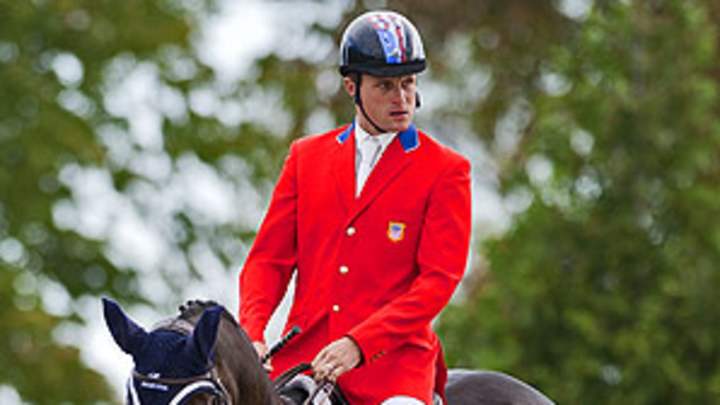Equestrian rallies after fire nearly burns Olympic dreams

But for the U.S. equestrian team member and 2012 Olympic hopeful, that saying was barely applicable when he nearly lost all of his horses and staff when his barn caught fire at the end of May.
"[The saying] just says so much about his attitude," says the head manager of his horses and stables of just over a year, Lindsey Taylor. She pauses to reflect, "He kind of stopped saying that for awhile after the fire. I think it took a lot out of him, everything that we lost."
An electrical fire started shortly after midnight on the morning of May 31 in the barn where 11 of Martin's horses were housed downstairs and many of the members of his staff lived upstairs. Within minutes the smoke and flames were overwhelming. Three staff members made it out alive, taking with them the four horses they could reach. By the time Martin and Taylor, who lived a few miles away, arrived, firefighters were on site, preventing people from entering.
"I had a bit of an altercation with the fire chief," Martin recalls. "The firefighters had given up on the building."
He and his coach, Phillip Dutton, who is the owner of the barn as well as one of Martin's teammates on the U.S. national equestrian team in eventing, ignored orders and raced inside. The first stall door they reached belonged to Neville Bardos, a then 10-year old gelding whose life Martin had already saved once when he bought him rather than allow his previous owner to send him to the glue factory. By the time they got him out, there was no hope for the others. The barn burned to the ground.
The grieving process was slow. Martin, now 31, the son of two Olympians -- neither equestrians -- shelved his own Olympic dreams briefly as he tried to get his feet back under him. The equestrian community, so supportive that riders will often coach their competitors, donated time and supplies and money. The five surviving horses had to recover from smoke inhalation and burns. They were relocated to temporary stalls at Martin's other barn.
Three months later, Martin and Neville placed seventh -- the top among Americans -- at the Land Rover Burghley Horse Trials in England, an Olympic-level competition, and one of the three events in the Grand Slam of Eventing. And they knew they were back in it.
Martin was born in Australia to an American speed skater mother and an Australian cross-country skier father. Instead of following in his parents' footsteps, Boyd turned to pony club at age 12 with most of his friends. He chose eventing, a discipline developed from a cavalry test that combines dressage, a cross-country endurance element and show jumping, because "it's a very young guy's sport in Australia," he says. "The best part is cross-country, galloping at high speed."
He decided he preferred riding to going to class -- "I wasn't very good at school," he says with a laugh -- so he became a working student, equestrian's version of something like an unpaid intern, at the National Equestrian Centre at 18.
He moved to the U.S. seven years later, training as an American but competing as an Australian, and worked for Dutton. Once he made the decision to spend his career in the U.S., he used his dual citizenship to apply to compete as an American.
"I wanted to support the U.S. system, which had basically given me my career," he says.
He settled in Pennsylvania with his wife, Silva, a dressage instructor. They ride in the same arena every day and often work on dressage together. Although he is the Olympic hopeful, "she's much better," he laughed. Otherwise he works with Dutton, his coach, landlord, teammate and also his competitor.
This arrangement is common in eventing -- indeed, Martin often competes against riders he himself is coaching -- but it does lead occasionally to confused rooting interests. In '10, at the World Equestrian Games, Martin and Neville finished 10th, Dutton and his horse, Woodburn, 18th. Luckily, there is room for both of them on the U.S. Olympic team, which will send between three and five athlete-horse pairs to London.
"Hopefully we're both good enough to make the team and compete for the country," Martin says.
Based on Neville's results this year, he is one of four horses the USOC has determined that Martin will be eligible to ride if he makes the Olympic team. The others are Otis Barbotiere, Ying Yang Yo and Remington. The four will be whittled down to one closer to the Games. Much closer, if Martin is to be believed: "Probably the day before the event," he said and laughed. "They'll select the team probably three or four weeks before and have a couple alternates on standby, but you never know."
Neville is one of his favorites, though.
"[Martin] always jokes that he loves [Neville] for the seven minutes or 11 minutes a year [depending on the length of the event] when he gets to ride him around a cross-country course," Taylor says, "and he puts up with him the rest of the year."
Martin will be happy to put up with Neville for as long as he has to.
After all, things could always be worse.
